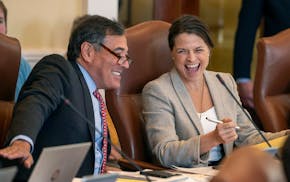MIAMI - Black voters' disappointment with President Obama, who they so eagerly embraced, could be costly on Election Day to Democrats, who badly need a big African-American turnout to win Senate and gubernatorial races in key states.
Instead, many blacks see an unemployment rate well above the national average, continuing problems with crime in many neighborhoods, and a president more interested in trying to help other voting blocs that didn't give him such unwavering support.
He talks about same-sex marriage in a nod to the gay and lesbian community. He discusses immigration and its benefits, an issue particularly important to the Latino community. He fights for equal pay, a vital issue to the women Democrats so avidly courted.
The black community, which gave Obama support like no other group, too often doesn't see the investment paying off. "People in this community just don't think anything is going to change," said Akua Scott, a Miami-based labor organizer.
Instead of obvious improvements in the economy, jobs can be tough to get and despair remains. "A lot of people don't understand how government works. They think the president is a savior," she said.
Obama, however, remains hugely popular among blacks; last month's McClatchy-Marist poll found 86 percent approved of the job he's doing. But the disapproval number was 12 percent, double its level just after the 2012 election.
In Miami's Overtown neighborhood, a historic black community, people don't necessarily blame the president for making it hard to get a job or stay financially afloat, but they had hoped for more.
"We had this idea that once we got the first black president, all our problems would be solved," said Aaron McKinney, a Miami community organizer. He walked around the Jackson Soul Food restaurant in Overtown one day recently urging people to vote.
"People are happy to see a black man as president, but people in this environment see no way out," said Dorrell Brown, a Miami longshoreman. "This is what they've believed for a long time, and it's not changing."
He and others echoed the views of some leading black scholars and commentators who have criticized Obama for not doing enough.
"He posed as a progressive and turned out to be counterfeit," Cornel West, a professor of philosophy and Christian practice at Union Theological Seminary in New York City, told Salon.com in August.
Big turnout needed
Democrats badly need black voters to turn out in November. Its most endangered Senate incumbents last ran in 2008, the year Obama first won the presidency.
When blacks stay home, Democrats in states with large black constituencies often lose. In Florida, former Gov. Charlie Crist, running as a Democrat, needs those voters. Florida's black voters gave Obama 95 percent of the 2012 presidential vote and made up 13 percent of the electorate.
In the state's 2010 gubernatorial election, their share was 11 percent. The drop in turnout hurt. Though blacks gave Democrat Alex Sink 93 percent of their vote, Republican Rick Scott, who's now running against Crist, won by 1 percentage point.
Black turnout could matter in governors races in Arkansas, Maryland, Michigan, Georgia and South Carolina, and it also could be crucial in swinging a handful of Senate races this year.
In Louisiana, Sen. Mary Landrieu, a Democrat, has a tough road to re-election. She last won six years ago, when the black vote was 29 percent of the total and gave her a 96 percent to 2 percent majority, according to exit polls. That more than offset her 2-1 losing ratio among whites.
In North Carolina, another Democrat, Sen. Kay Hagan, is also battling for another term. In 2008, blacks were 19 percent of the vote and Hagan rolled up a 96-1 win while losing the white vote by 18 percentage points. She won that race with 53 percent. Strong black turnout could also be crucial to Democrats in Georgia, Kentucky and Arkansas.
Getting African-Americans to vote for anyone this year is clearly going to be difficult. Louisiana's black share of the vote plunged from 29 percent in 2008 to 24 percent in 2010.
Democrats figure they just have to break through with the kind of pointed message Rep. Gregory Meeks, D-N.Y., chairman of the black caucus' political action committee, offers. "We have to convince people this is like voting in a presidential election," he said.

Kennedy family makes 'crystal clear' its Biden endorsement in attempt to deflate RFK Jr.'s candidacy
Biden administration moves to make conservation an equal to industry on US lands
Convenience store chain where Biden bought snacks while campaigning hit with discrimination lawsuit

